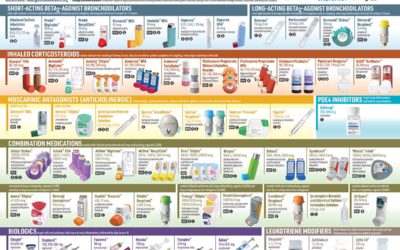The device will offer a new treatment option for people who prefer a needle-free way to treat anaphylaxis.
Anaphylaxis
Respiratory Inhalers at a Glance and Other Posters in Our Online Store
Learn about some of the most popular items in our Online Shop including inhaler posters, and other asthma, allergy, and anaphylaxis posters.
Anaphylaxis = Epinephrine: Treating a Severe Allergic Reaction
It happened again. A 14-year-old boy with a known peanut allergy ate a granola bar at school,...
Elijah’s Law to Protect Food Allergy Kids Expanded
Elijah’s Law is legislation that implements food allergy and anaphylaxis education, policies and...
Ask the Allergist: What’s the Difference Between Food Allergy and Food Sensitivity?
What should you watch for when identifying if symptoms are food allergy or a food sensitivity? We spoke with allergist Jay Lieberman, MD.
Why You Shouldn’t Keep Epinephrine in a Hot Car
Learn more about a new study that shows exposure to heat in a car on a sunny day can decrease the concentration of epinephrine in auto-injectors.
School-Based Allergies and Asthma Management Program Becomes Law!
The president has signed into law HR 2468, the school based allergies and asthma management program act (SAMPRO) to help schoolchildren with asthma.
Ask the Allergist: Infant Anaphylaxis and Food Allergies
Dr. Michael Pistner explains how to recognize the symptoms of a severe food allergy reaction in infants and toddlers.
Thomas Silvera Discusses His Son Elijah’s Legacy After Tragic Food Allergy Death
Elijah passed away after he had an anaphylactic reaction to a grilled cheese at his daycare. Elijah’s family now advocates for better training in daycares
How to Prepare for Major Storms or Natural Disasters If You Have Asthma or Allergies
Learn how to take extra precautions in preparation for hurricanes, earthquakes and other natural disasters if you have asthma or allergies.
Back to School with Allergies and Asthma – COVID-19 Edition
Learn how to prepare students with allergies and asthma for school, with the latest information regarding COVID-19 issues for schools and students.
Need Help Paying for Allergy and Asthma Medications?
Learn more about discounts, patient assistance programs, and other ideas for affording asthma, allergy and anaphylaxis medications.
All About
Anaphylaxis is a severe allergic reaction affecting multiple organ systems and can be fatal if not treated immediately. Exposure to allergens causes a drop in blood pressure and the airways to constrict. Once there are visible symptoms, the condition can worsen quickly, and death may occur in minutes. People who are prone to allergic reactions from food, insect venom, medication and latex should always be prepared for anaphylaxis as symptoms can worsen and change without warning. Someone that experiences mild swelling from a bee sting can subsequently experience potentially fatal symptoms. People with a history of anaphylaxis, a family history of such reactions, or who suffer severe allergies or asthma should all be aware of what to do in an emergency.
Symptoms can include swelling and hives at the site or in the mouth, lips and tongue. Vomiting, shortness of breath, chest pain, wheezing, dizziness, weak pulse, fainting, watery eyes, stuffy nose, sweating, confusion and losing consciousness can also occur. If someone goes into anaphylactic shock, time is of the essence. Epinephrine should be given immediately. Waiting to see if symptoms worsen can be fatal. Emergency treatment should always be sought; even if symptoms improve, the patient needs observation as it is common for a second reaction to occur even hours later.
Epinephrine increases heart rate and blood pressure, relaxes muscles in the airways, helps swelling, and suppresses the patient’s immune response, effectively stopping the reaction. There is no substitute for epinephrine injection; antihistamines only work on mild reactions such as swelling, so do not delay treatment.
Two epinephrine auto-injectors should always be available, as well as an emergency plan with details about symptoms and how to use the device prescribed, especially in the case of at-risk children to have at school or when not with their parents. Epinephrine devices should always be stored at room temperature, never in direct sunlight, and always checked for oxidation and expiration. If the medication has particles or isn’t clear, replace it immediately.











